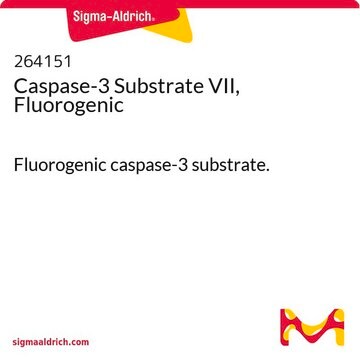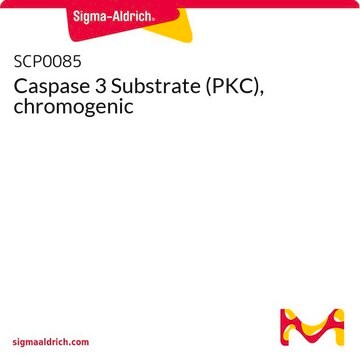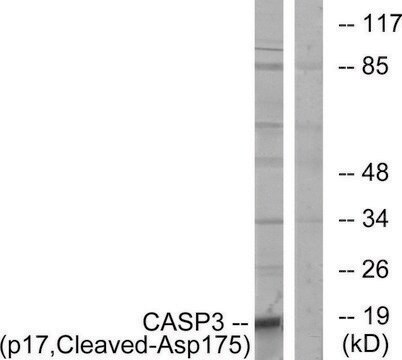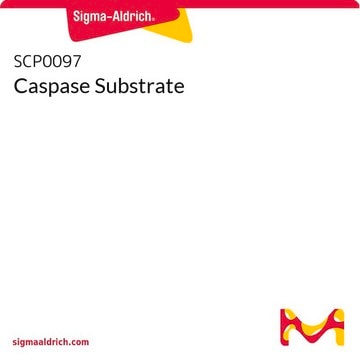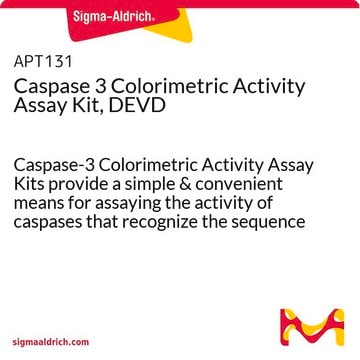All Photos(1)
About This Item
Empirical Formula (Hill Notation):
C31H39N5O12
Molecular Weight:
673.67
UNSPSC Code:
12352202
NACRES:
NA.32
Recommended Products
product name
Caspase 3 Substrate,
Assay
≥95% (HPLC)
form
lyophilized
composition
Peptide Content, ≥80%
storage condition
protect from light
storage temp.
−20°C
Amino Acid Sequence
Ac-Asp-Glu-Val-Asp-4M2NA
General description
Caspase 3 belongs to the family of cysteinyl proteases, which regulate apoptosis. It is encoded by CASP-3 gene. Caspase 3 is important for normal brain development. Caspase 3 is involved in growth stimulation of surviving tumor cells. It is associated with neuronal apoptosis in Alzheimer′s disease.
Application
Caspase 3 Substrate has been used to determine caspase activity in esophageal squamous cell carcinoma EC109 cell line.
Caspase 3, a cysteine protease activator of caspase 6 and caspase 7, metabolizes amyloid-β 4A precursor protein. Caspase 3 may be detected using a variety of chromogenic and fluorogenic peptide substrates built around the DxxD (asp-x-x-asp) sequences DMQD and DEVD such as Ac-DMQD-pNa (Acetyl-Asp-Met-Gln-Asp-p- nitroanalide), chromogenic; Ac-DMQD-AMC (Acetyl-Asp-Met-Gln-Asp- amino-4-methylcoumarin), fluorogenic and Ac-DEVD-4M2Na.
Storage Class Code
11 - Combustible Solids
WGK
WGK 3
Flash Point(F)
Not applicable
Flash Point(C)
Not applicable
Certificates of Analysis (COA)
Search for Certificates of Analysis (COA) by entering the products Lot/Batch Number. Lot and Batch Numbers can be found on a product’s label following the words ‘Lot’ or ‘Batch’.
Already Own This Product?
Find documentation for the products that you have recently purchased in the Document Library.
Customers Also Viewed
Caspase-3-generated fragment of gelsolin: effector of morphological change in apoptosis
Kothakota S, et al.
Science, 278(5336), 294-298 (1997)
Emerging roles of caspase-3 in apoptosis
Porter AG and Janicke RU
Cell Death and Differentiation, 6(2), 99-99 (1999)
Caspase 3-mediated stimulation of tumor cell repopulation during cancer radiotherapy
Huang Q, et al.
Nature Medicine, 17(7), 860-860 (2011)
Caspase-3 is enriched in postsynaptic densities and increased in Alzheimer's disease
Louneva N, et al.
The American Journal of Pathology, 173(5), 1488-1495 (2008)
Resveratrol-induced apoptosis is enhanced by inhibition of autophagy in esophageal squamous cell carcinoma
Tang Q, et al.
Cancer Letters, 336(2), 325-337 (2013)
Our team of scientists has experience in all areas of research including Life Science, Material Science, Chemical Synthesis, Chromatography, Analytical and many others.
Contact Technical Service

